This article belongs to the “Studying the Lord’s Prayer with Brad Young” series. For an overview of the entire series, click here.
The deceptively simple petition from Matthew 6:11, “Give us this day our daily bread,” has been a matter of controversy for centuries. The unusual Greek word ἐπιούσιον (ep·i·OU·si·on), which is translated “daily,” is the root of the controversy. Some scholars have suggested that the original phrase contained the similar-sounding Greek word ἔπειμι (EP·ei·mi, “the next”), and so meant “bread for the next day.” Nevertheless, the Latin translation of the New Testament understood the word as meaning bread needed for sustenance.
Jerome (A.D. 342-420) remarked in his commentary on Matthew that he had found in the Gospel of the Nazarenes the Hebrew word מָחָר (mā·ḤĀR, “tomorrow”) with the word for bread. However, māḥār has no textual witness other than Jerome’s recollection, and furthermore it cannot account for the somewhat obscure Greek word epiousion. While it is true that the Greek epeimi is close to “tomorrow” in meaning, a translator most likely would have used the common Greek word for tomorrow, αὔριον (AV·ri·on), to translate the Hebrew māḥār.
Paid Content
Premium Members and Friends of JP must be logged in to access this content: Login
If you do not have a paid subscription, please consider registering as a Premium Member starting at $10/month (paid monthly) or only $5/month (paid annually): Register
One Time Purchase Rather Than Membership
Rather than purchasing a membership subscription, you may purchase access to this single page for $1.99 USD. To purchase access we strongly encourage users to first register for a free account with JP (Register), which will make the process of accessing your purchase much simpler. Once you have registered you may login and purchase access to this page at this link:
































































































